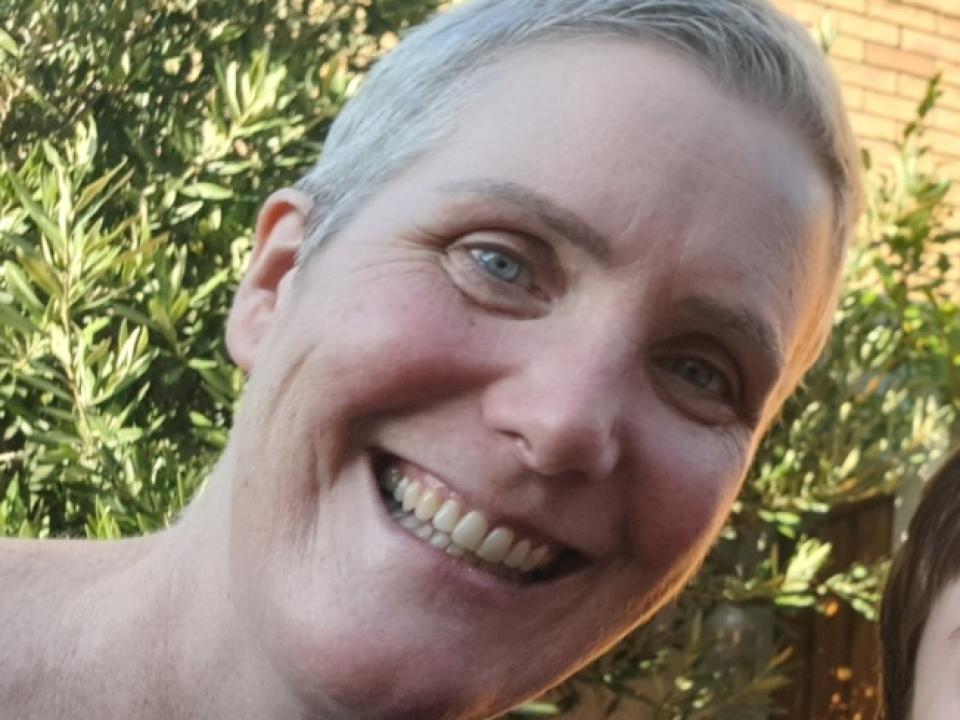“Every cancer treatment is different but because we’re all on the trial, we’ve had such similar experiences.” - Emma's story

In October 2021, Emma Clancy was recovering from Covid when she woke one morning with a sharp pain in her breast. “I thought, ‘that’s sore’. I didn’t know that was a Covid-related issue. But I didn’t think anything more of it,” says the 47-year-old, who lives in Leopardstown, Dublin.
When the pain returned a week later, she did a breast check and realised she could feel something in her right breast.
Emma, who works in insurance, made an appointment the next day with her GP. She was referred for a triple assessment and was called to St Vincent’s University Hospital at the end of October.
At this stage, Emma was hoping that the lump might just be a cyst but when she returned the following week for her results, she was told that she had triple negative breast cancer. “I was completely shocked, and that really was the start of everything,” says Emma, who has a 10-year-old son called Oscar.
Her proposed treatment plan was chemotherapy first to reduce the size of the tumour, then surgery, followed by radiation. The next steps were MRI and CT scans before meeting with her oncologist.
In the month between her triple assessment and seeing her oncologist, the scans unfortunately showed her cancer had grown significantly. “I was told I had to start chemotherapy the next morning after my oncology appointment and that I could not wait even a few days. That was really scary and surreal…like it was happening to somebody else.”
Emma began her 16 sessions of chemotherapy, which finished slightly later than anticipated after she contracted Covid again. On June 13th, she underwent a mastectomy, the removal of her lymph nodes and a DIEP flap reconstruction.
When she met with her breast surgeon, she was told that the tumour was bigger than they had anticipated and that they had found cancer in a significant number of lymph nodes. More chemotherapy was proposed as a follow up treatment.
“I went home and cried,” says Emma. “It took quite a while to absorb and process that information.” It was at this point that Emma’s oncologist raised the possibility of her taking part in the SASCIA clinical trial.
“My oncologist said that the trial wouldn’t have as big a benefit for me as it would future patients down the line. But it was a no-brainer. My husband and I looked at each other and said yes, let’s go for it.”
The Irish Cancer Society has invested millions of euro into clinical trials since 2012, with a €1 million investment in both 2021 and 2022 respectively. The aim of these trials is to test new and more effective ways to prevent, diagnose, and treat cancer.
“She explained to me and my husband Eamon that the usual or standard treatment at this point would be an oral tablet that you take at home over a 24-week period. But if I was willing and accepted into the SASCIA trial it would be randomised whether I would receive the standard care (oral tablet) or the trial drug, and my progress would be followed up for five years after treatment.
The trial drug would be more disruptive than the oral tablet, being intravenous, two weeks on and one week off for eight cycles. And there was a good chance my hair would fall out again - it did - as well as suffering nausea and fatigue.”
“My oncologist said that the trial wouldn’t have as big a benefit for me as it would future patients down the line. But it was a no-brainer. My husband and I looked at each other and said yes, let’s go for it.”
Before she could start further chemotherapy, Emma had six weeks of radiotherapy. In October 2022, she was selected for the trial drug, and she began this on October 20th.
One of the silver linings she sees of the trial has been the friendships that have developed with the other women who are also on the trial. “We set up a WhatsApp group to keep in contact between treatments. To ask how is everyone doing today? How are you feeling and did you sleep OK? How’s the mood? It was so tough to face chemotherapy again, physically and mentally, but we knew we were in the same place,” she says. “Every cancer treatment is different but because we’re all on the trial, we’ve had such similar experiences.”
A third bout of Covid, and getting the RSV virus resulted in Emma missing some doses of the trial. But she is now almost finished her treatment and a recent CT scan was all-clear.“We can finally go on that family holiday that was booked before Covid,” she says.
“I know that there’s still a good deal ahead in terms of recovery and preparing for real life. The last 18 months have gone by in a blur. With my breast cancer, there was a 50pc reoccurrence rate in the first three years. The extra chemotherapy has hopefully reduced those odds. I’ve still got another 18 months until I get to three years but it’s brilliant that, at this point, all is fine.”
During her treatment, Emma used the services of the Daffodil Centre in St Vincent’s University Hospital. “They were great she said, and all the information I got there was very helpful, like the booklet on how to tell your children. We followed the advice given to not tell Oscar things that we couldn’t stand over.”
“There are also the services like transport to and from treatments as well. Although I didn’t avail of this, because my friends were brilliant enough to bring me for treatments to let Eamon focus on the school run, that support is there. They’re invaluable to people you meet in hospital, who mightn’t have the home support that I’m lucky to have.”
For more information
Phone
1800 200 700
